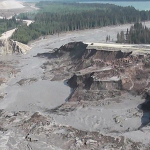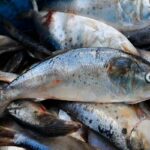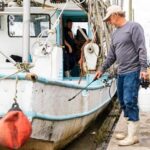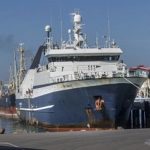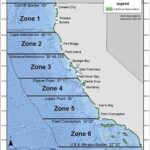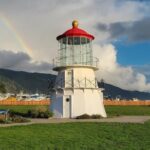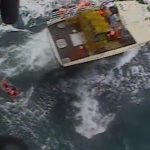Tag Archives: Iceland
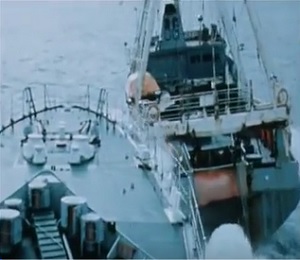
Fighting for Fish – The Cod Wars and Today: Lessons from an Almost War
Not once, but three times in the 20th Century, cod was almost the causus belli between Iceland and the United Kingdom in a string of events referred to collectively as the “Cod Wars.”1 The Cod Wars, taken together, make clear that issues of maritime governance and access to maritime resources can spark inter-state conflict even among allied nations. Fishing rights can be core issues that maritime states will vigorously defend. The First Cod War started on September 1st, 1958. Icelandic coastguardsmen sought to arrest and impound any British trawlers within their new 12-mile limit. >click to read< 09:59
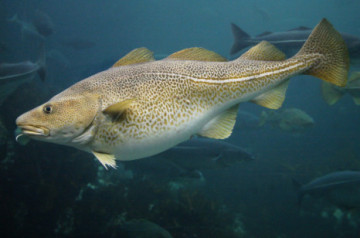
Icelandic Cod Spray Bodes Well Against Coronavirus
While several countries across the globe are vying to create a vaccine against COVID-19, Iceland, a nation of fishermen, has come up with a possible solution of its own. PreCold, a mouth spray intended to be used against the first symptoms of a cold based on cod enzymes, has proven efficient during tests and managed to deactivate about 98.3% of the virus that causes COVID-19, national broadcaster RÚV reported. The spray creates a protective film in the pharynx where the viruses that cause the common cold tend to localise and replicate. The film using enzymes extracted from cod offal, weakens viruses so they fail to replicate to a degree that makes the host sick. >click to read< 07:27

Further protection measures coming to protect North Atlantic right whales
Federal Fisheries Minister Bernadette Jordan says Ottawa will announce further measures in the coming weeks to protect the endangered North Atlantic right whale. Speaking to a fishing gear innovation summit in Halifax today, Jordan didn’t release any details of the coming measures.,, The minister says testing also continues on new technology such as ropeless gear, which could help reduce the risk of entanglements for whales. More than 250 harvesters and fishing gear manufacturers from Canada, the United States, Iceland and Norway are attending the two-day summit. >click to read< 12:50
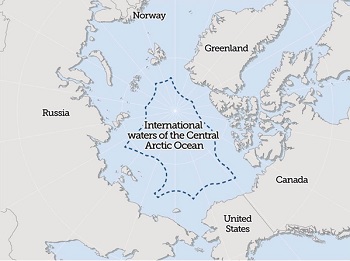
U.S. ratifies The Agreement to Prevent Unregulated High Seas Fisheries in the Central Arctic Ocean
The United States has become the fourth jurisdiction after Canada, the European Union and Russia to ratify a landmark international agreement that aims to prevent unregulated commercial fishery in the high seas of the Central Arctic Ocean, officials at the State Department announced Tuesday. The Agreement to Prevent Unregulated High Seas Fisheries in the Central Arctic Ocean, which was signed in Ilulissat, Greenland last October, includes the so-called Arctic Five – Canada, Norway, Russia, Denmark (Greenland and the Faroe Islands), the U.S. – as well as the major fishing nations – Iceland, Japan, South Korea, China and the EU. >click to read< 17:56
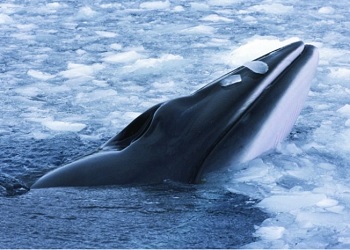
Supply and Demand – Fishermen In Iceland Will Not Hunt Whales For The First Time In 17 Years
Fishermen from Iceland will not hunt whales this summer, this will the first year in 17 years that the fishermen will abandon the whale hunting season. Owners of fishery companies explained why they will be skipping this season, they said that the low demand for whale meat in countries like Japan has forced them to abandon the whale hunting season this year. Loftsson explained their decision, he said that this was all because of the low demand in the Japanese Market. But according to a captain, the real reason why fishermen were skipping this year’s hunting season is that the permit was not handed out in time. >click to read< 14:03
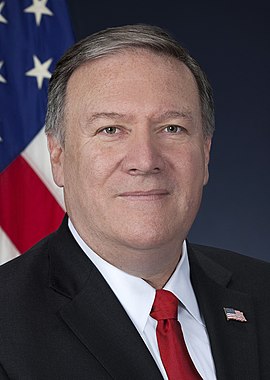
Pompeo calls out Canada, China, Russia over Arctic policy. China entitled to ‘exactly nothing.’
U.S. Secretary of State Mike Pompeo stunned onlookers Monday by taking swipes at Canada, China and Russia in a speech to delegates attending the Arctic Council ministerial. Pompeo, along with foreign ministers from the seven other Arctic nations — Canada, Denmark, Finland, Iceland, Norway, Sweden and Russia — is in Rovaniemi, Finland this week for the eleventh Arctic Council ministerial meeting. Pompeo used his speech to call out countries he accused of making illegitimate claims to Arctic territory, citing Canada’s claim to the Northwest Passage as internal waters. The U.S. considers the Northwest Passage to be international waters. >click to read<09:57
US climate objections sink Arctic Council accord in Finland – click to read<10:39
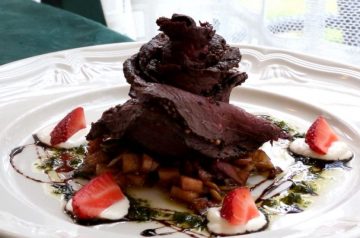
In Iceland, activists, industry are raging war over commercial whaling
In Iceland, a worldwide hotspot for whale watching, gentle giants seem to rule the sea. But all the while some species of whales are still being hunted. Iceland is one of just two countries in the world that allows commercial whaling in defiance of the International Whaling Commission’s ban on whaling, making this island nation the frontlines of the war on whaling. “Iceland is all fishermen,” said Kristjan Loftsson, the managing director of the Icelandic whale hunting company, Hvalur H/F. “We are utilizing the ocean.” >click to read<14:30
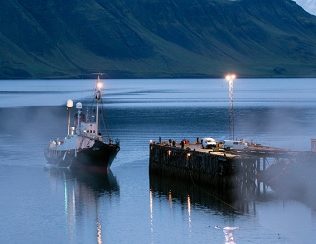
Kristjan Loftsson’s company is the last one in the world still hunting fin whales. His credo: “If it’s sustainable, you hunt.”
Mr. Loftsson, 75, is the world’s last commercial hunter of fin whales. He has been denounced by environmental groups and his boats have been sunk by radical activists, but his business is legal here because Iceland doesn’t recognize the international moratorium on commercial whaling. Mr. Loftsson likes to say that whale blood runs in his veins. For Mr. Loftsson and his supporters, whaling is no different than agriculture or fisheries. “If it’s sustainable, you hunt,” he said. >click to read<10:48
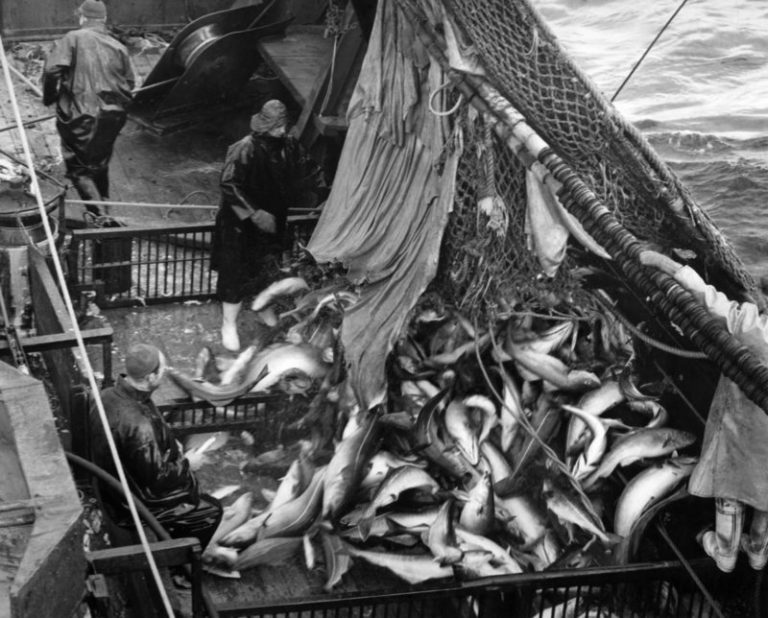
How Iceland Beat the British in the Four Cod Wars
In Icelandic, they were known as Þorskastríðin, “the cod strife,” or Landhelgisstríðin, “the wars for the territorial waters.” In English, they were simply “the Cod Wars.” Between the late 1940s and 1976, the two island nations of Iceland and the United Kingdom all but declared war—despite the fact that there were almost no casualties, and the former had no army. In the frigid waters between these two nations, four confrontations took place between Great Britain, a world superpower, and Iceland, a microstate of just a few hundred thousand people. Each time, Iceland won. And it all happened because of cod—and the right to fish it. These were the Cod Wars. >click to read<08:56
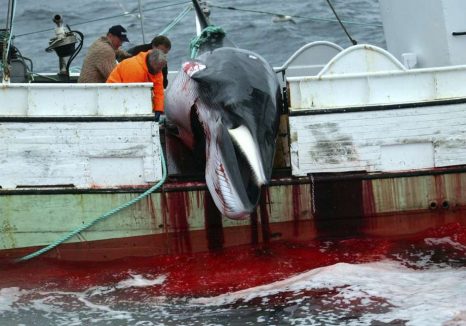
Iceland company to resume commercial hunting of fin whales
A whaling company in Iceland said Tuesday it is preparing its fleet to bring commercial hunting of fin whales back to the Nordic island nation after a two-year freeze. Whaling company Hvalur hf (Whale Inc.) said it is readying two vessels for the 100-day summer whaling season. Fin whale hunting stopped in Iceland after the 2015 hunt, when Japanese authorities refused to import Iceland’s catch because of unmet health code requirements. Fin whales are the world’s second-largest whales after blue whales, and Iceland is the only country where the marine mammals can be hunted commercially. >click to read<15:24
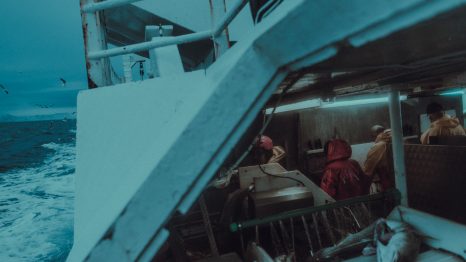
12 hours on a fishing trawler in Iceland.
It was about 5:30 am when we boarded the fishing trawler. The slick deck of the boat was barely visible under the dim sodium vapor lamps as we were greeted by handshakes and warm good mornings from the crew members. The night before, my Italian producer and I had driven 2.5 hours from Reykjavik after a night of drinking. We’d barreled along desolate, straight highways to a small homestay where an elderly Icelandic man had shuffled us into a room lined with bunk beds before setting off to sea. We’d missed every famously photographed landmark in Iceland on this trip, but the ensuing 12 hours on an Icelandic fishing trawler made it all worthwhile. Photo article, >click here< 10:15
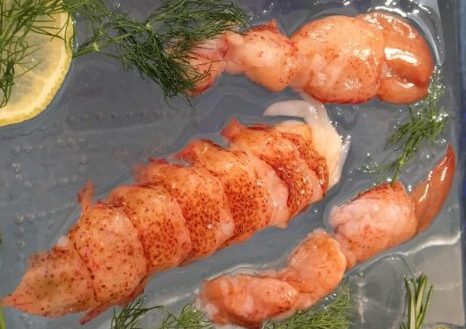
Iceland is selling whole, raw lobsters – already shelled – for £15.
At this price, the lobsters, weighing about 140g, are considerably more expensive than the ones already in their shell that the likes of Aldi sell at Christmas for £6, or the pair of lobster tails that Asda sells for £12. But Iceland is confident that it will be a hit with British shoppers, many of whom see lobster as a key part of a Christmas buffet or meal. Sales of lobster jumped 32 per cent last year, helped by a price war which saw Lidl sell lobster for just £2.99 for a limited time in December. click here to read the story 09:35
Fisherman’s Strike Ends: “We Had A Gun To Our Heads”, Says Union Leader
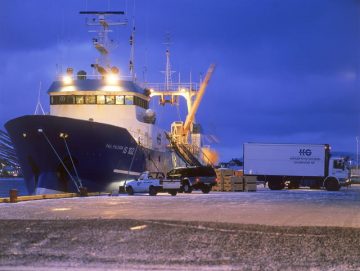 The strike that went on for about two months has finally drawn to a close, but one union official says the deal was reached after the Minister of Fisheries essentially threatened to enact a law forcing the fishermen back to work. RÚV reports that the vote to go back to work was a close one: 52.4% voted in favour, with 46.9% voting against, and only 53.7% of eligible fishermen took part in the vote. As to be expected from such a close vote, opinion was mixed amongst fishermen reporters spoke to. A great many were simply pleased to be back to work, while many others were still unsatisfied with the terms of the new collective bargaining agreement. Continue reading the story here 09:10
The strike that went on for about two months has finally drawn to a close, but one union official says the deal was reached after the Minister of Fisheries essentially threatened to enact a law forcing the fishermen back to work. RÚV reports that the vote to go back to work was a close one: 52.4% voted in favour, with 46.9% voting against, and only 53.7% of eligible fishermen took part in the vote. As to be expected from such a close vote, opinion was mixed amongst fishermen reporters spoke to. A great many were simply pleased to be back to work, while many others were still unsatisfied with the terms of the new collective bargaining agreement. Continue reading the story here 09:10
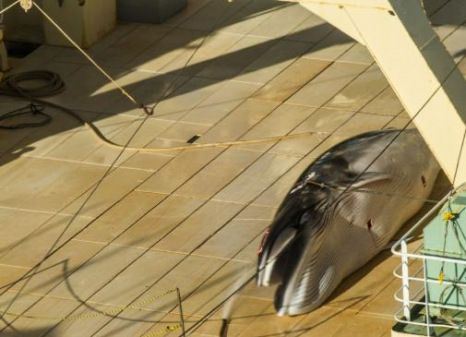
Australian Government ‘disappointed’ as minke whale slaughtered in our waters – Why the Hunt Goes On
The Federal Government has this morning condemned Japan after one of its ships was caught whaling in the waters off Antarctica. Anti-whaling group Sea Shepherd released photos showing a dead minke whale on the deck of the Nisshin Maru ship in the Australian whaling sanctuary. It appears the death was playing out at the same time as Japanese Prime Minister Shinzo Abe’s weekend meeting with Malcolm Turnbull in Sydney, at which the ABC reports whaling was ‘mentioned’, but focused on trade and defence. Japan is a signatory to the International Whaling Commission’s moratorium on whaling in force since 1986. But it exploits a loophole allowing whales to be killed for the purposes of “scientific research”. Read the story here What are the issues behind Japan’s whaling programme, and why has compromise been so difficult? Isn’t whaling banned? Not quite. The International Whaling Commission (IWC), which regulates the industry, agreed to a moratorium on commercial whaling from the 1985. But it did allow exceptions, enough for Japan to hunt more than 20,000 whales since. Read the story here 11:28
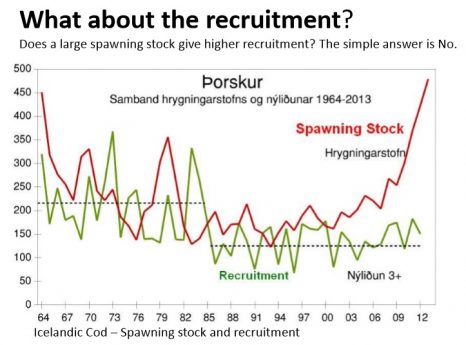
Fisheries management kills both fish stocks and fishermen
Fishery management seems only to reduce the fishery and to counterbalance that, fishermen are killed. The modern mathematical fishery management has been a total failure. Constant cuts in effort and quotas to protect stocks against supposed “over fishing” in order to build up stocks in order to get increased catches later have not lived up to the promises, least to say. But the orthodox science will not face the truth. Below is a link to a presentation I had on the subject at a recent conference in Faroe Islands. There they abandoned the quota system in 1996 and took up effort system, based on days at sea. But a constant reduction of days, to prevent over fishing, has ruined the fishing grounds. Please note that there is both English and Danish text in the presentation, saying the same thing. This presentation is about the result of fishery management. The scientists maintained that by reducing the catch of small fish they would grow bigger and give more catch later. In most cases this has not been the case, and we are still waiting for the later to come. Examples are shown. Read the presentation by Jon Kristjansson, fisheries scientist, Iceland Click here 16:36
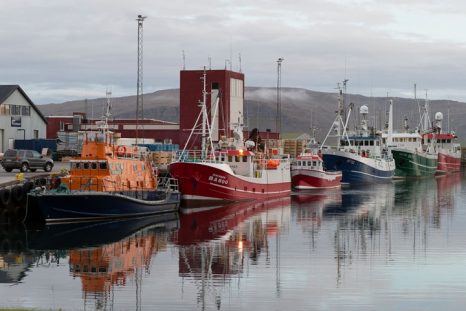
Shoreside Workers’ Wallets Affected by Fishermen’s Strike
Numerous workers in fish processing are out of a job, due the fishermen’s strike, which resumed December 14. A number of workers in Vestmannaeyjar islands are now registering as unemployed, mbl.is reports. The fishermen’s strike has extensive effects, both on jobs at sea and in fish processing, in addition to affecting Iceland’s position on fish markets. One after another, fish processing plants reduce their operations as they run out of fish. Employees are, thus, faced with uncertainty. Four out of six fish processing plants in Vestmannaeyjar had to halt processing due to a lack of fish before last weekend, and the rest will cease processing this week. Most plants in the West Fjords have run out of fish. Only catches from small fishing boats, not affected by the strike, can be processed, but not many of those are fishing these days. When fish is lacking, the law allows for employees to be taken off the payroll and be registered as unemployed without delay, mbl.is reports. According to RÚV, fish processing plants in the West Fjords have no plans to take their employees off the payroll, but without fish, no overtime or piecework is paid, thus, reducing the workers’ income. Link 14:30
Dozens of Icelandic Fishermen Charged with Tax Fraud
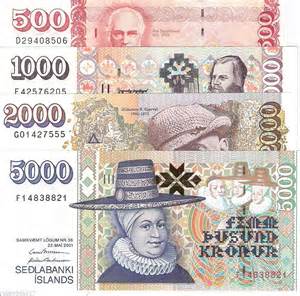 Fifty-seven Icelandic fishermen, who worked for Icelandic fisheries abroad, are suspected of having failed to pay income tax in Iceland, where they resided, Fréttatíminn reports. Their cases comprise more than half of the 108 tax fraud cases connected to the Panama Papers, which are under investigation by the Directorate of Tax Investigation in Iceland. The Directorate has filed charges in a majority of the fishermen’s cases, which are now in the hands of a district prosecutor. The fishermen worked for Icelandic fisheries in Africa, among others, but lived in Iceland. In some cases, tax evasions are believed to amount to tens of millions of krónur. Read the rest here 11:24
Fifty-seven Icelandic fishermen, who worked for Icelandic fisheries abroad, are suspected of having failed to pay income tax in Iceland, where they resided, Fréttatíminn reports. Their cases comprise more than half of the 108 tax fraud cases connected to the Panama Papers, which are under investigation by the Directorate of Tax Investigation in Iceland. The Directorate has filed charges in a majority of the fishermen’s cases, which are now in the hands of a district prosecutor. The fishermen worked for Icelandic fisheries in Africa, among others, but lived in Iceland. In some cases, tax evasions are believed to amount to tens of millions of krónur. Read the rest here 11:24
Fishermen’s Strike Could Start Tonight
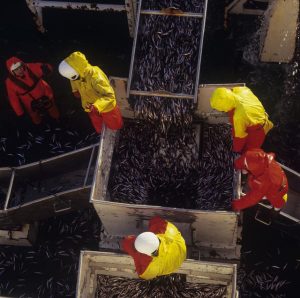 A strike of 3,500 Icelandic fishermen will begin tonight at 11 pm unless an agreement can be reached between them and Fisheries Iceland by that time, RÚV reports. The negotiating parties will meet with the state negotiator at 1:30 pm in a final attempt to prevent a strike. Garðar Helgason, head of Fisheries Iceland, told RUV he is cautiously optimistic an agreement can be reached in time. The head of the Fishermen’s Association, Valmundur Valmundsson, could not be reached for comment. If no agreement is reached, this would be the first fishermen’s strike in 15 years. There are three ships fishing in the Barents Sea. It would take them three to four days to reach harbor in Iceland. An agreement has been reached regarding the price of fish, which was the largest bone of contention. link 09:25
A strike of 3,500 Icelandic fishermen will begin tonight at 11 pm unless an agreement can be reached between them and Fisheries Iceland by that time, RÚV reports. The negotiating parties will meet with the state negotiator at 1:30 pm in a final attempt to prevent a strike. Garðar Helgason, head of Fisheries Iceland, told RUV he is cautiously optimistic an agreement can be reached in time. The head of the Fishermen’s Association, Valmundur Valmundsson, could not be reached for comment. If no agreement is reached, this would be the first fishermen’s strike in 15 years. There are three ships fishing in the Barents Sea. It would take them three to four days to reach harbor in Iceland. An agreement has been reached regarding the price of fish, which was the largest bone of contention. link 09:25
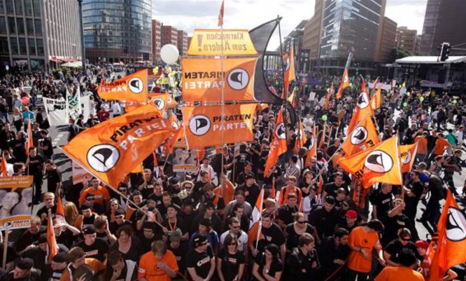
Iceland may become first nation ruled by ‘pirates’
The small island nation of Iceland may soon be the first modern country ruled by pirates. Not swashbuckling bandits with eye patches, but political pirates bent on rooting out corruption and transforming society through direct democracy. Their brand of politics is hacktivism meets revolution. Dominated by young people, the Pirates have grown from their founding in 2006 as a small Swedish movement battling restrictive copyright law into a quasi-mainstream political force. “The fisheries is a very big industry that has corruption problems,” says McCarthy on a drive through Keflavik, a city that used to be home to one of the most robust fishing industries in the country. “Tackling corruption in the fishing industry, and building a fair fisheries management system is absolutely crucial.” Quotas for cod and other fish were handed out by the government decades ago to the larger fishing companies in power, and they are now bought and rented out by large corporations for significant profit. Small fishermen can’t compete. Entire villages have had their quotas bought and moved away so there is no fishing left for the local population. Read the story here 08:11
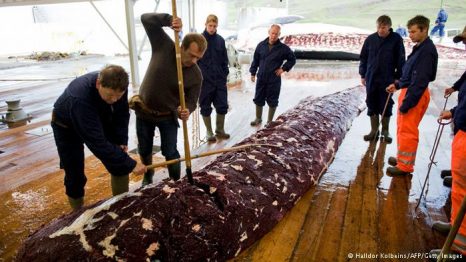
Controversial whale sanctuary to be voted on at the International Whaling Commission
A whale sanctuary in the South Atlantic covering an area as big as India and Russia together: This is the proposal presented by Argentina, Gabon, South Africa, Uruguay and Brazil at the 65th meeting of the International Whaling Commission in Slovenia, which runs from October 20 to 28. A heated debate between some 80 pro- and anti-whaling nations will lead tomorrow (25.10.2016) into voting on whether to give the green light to the proposal, or reject it once again – it happened in 1998. Japan, Iceland and Norway have been the three main countries blocking the sanctuary due – environmentalists say – to their commercial interests. These three nations have used legal loopholes and controversial arguments to keep hunting whales, even in existing sanctuaries. If the new sanctuary proposal is accepted, the immediate question following the hurrahs will be how to really protect whales there from countries that continue to insist on whaling. While the moratorium for commercial hunting from 1985 largely improved the protection of whales, threats such as by-catch or pollution were left out of the agreement. Whale sanctuaries are intended to fill that gap. Read the story here 13:12
Why do some countries still hunt whale’s?
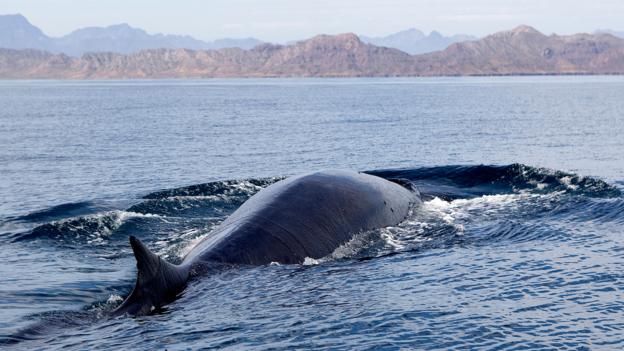 The “hacktivist” group Anonymous recently took down many Icelandic government websites, in protest at the country’s practice of . “Whales do not have a voice. We will be a voice for them. It’s time to speak out about this impending extinction of a species,,, Iceland is not the only country that still practices whaling: Norway and Japan also do so, as do a few smaller populations. This often baffles and horrifies people from elsewhere. If so many people are opposed to it, why are countries still whaling? (because they’re sustainable?) Read the article here 08:39
The “hacktivist” group Anonymous recently took down many Icelandic government websites, in protest at the country’s practice of . “Whales do not have a voice. We will be a voice for them. It’s time to speak out about this impending extinction of a species,,, Iceland is not the only country that still practices whaling: Norway and Japan also do so, as do a few smaller populations. This often baffles and horrifies people from elsewhere. If so many people are opposed to it, why are countries still whaling? (because they’re sustainable?) Read the article here 08:39
U.S. Coast Guard Unveils a New Model for Cooperation Atop the World
 The United States Coast Guard announced Friday the creation of a new international forum for cooperation in the Arctic. Signed at the United States Coast Guard Academy in New London, Connecticut, the new Arctic Coast Guard Forum will include coast guards or similar agencies from Canada, Denmark, Finland, Iceland, Norway, Sweden, Russia and the United States. “Today’s historic Arctic Coast Guard Forum represents a critical step forward in our collective efforts to promote safety, security and environmentally responsible maritime activity in the Arctic,” said Coast Guard Commandant Admiral Paul Zukunft. Read the rest here 10:50
The United States Coast Guard announced Friday the creation of a new international forum for cooperation in the Arctic. Signed at the United States Coast Guard Academy in New London, Connecticut, the new Arctic Coast Guard Forum will include coast guards or similar agencies from Canada, Denmark, Finland, Iceland, Norway, Sweden, Russia and the United States. “Today’s historic Arctic Coast Guard Forum represents a critical step forward in our collective efforts to promote safety, security and environmentally responsible maritime activity in the Arctic,” said Coast Guard Commandant Admiral Paul Zukunft. Read the rest here 10:50
40 Years Ago, The Last Cod War Was Sparked
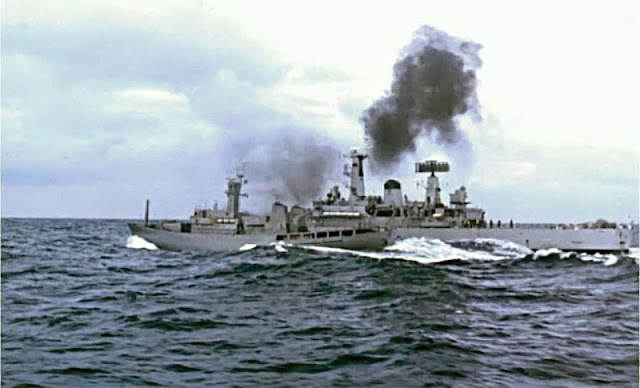 40 years ago yesterday, Iceland expanded its territorial waters from 50 to 200 miles, igniting the third – and last – of the Cod Wars, ending in Icelandic victory. As RÚV reports, October 15, 1975 marked the first time any nation declared for itself 200 nautical miles of territorial waters. The decision did not go unnoticed by the rest of the world, and the British in particular had objections, as they engaged in a considerable amount of fishing in the area Iceland was claiming for itself. What followed would be the most violent of the three Cod Wars. Read the rest here Video here 17:20
40 years ago yesterday, Iceland expanded its territorial waters from 50 to 200 miles, igniting the third – and last – of the Cod Wars, ending in Icelandic victory. As RÚV reports, October 15, 1975 marked the first time any nation declared for itself 200 nautical miles of territorial waters. The decision did not go unnoticed by the rest of the world, and the British in particular had objections, as they engaged in a considerable amount of fishing in the area Iceland was claiming for itself. What followed would be the most violent of the three Cod Wars. Read the rest here Video here 17:20
Iceland blasts Arctic Five for exclusion from fishing agreement
 Iceland says the recent Arctic fishing moratorium, signed by the five Arctic coastal states without Iceland’s participation, is “unacceptable” and a worrying precedent. “We have been able to have good cooperation between the eight (circumpolar) countries and it has been a success — until now,” said Gunnar Bragi Sveinsson, Iceland’s minister for foreign affairs and external trade, in an interview with Radio Canada International’s Eye on the Arctic this week. Read the rest here 07:50
Iceland says the recent Arctic fishing moratorium, signed by the five Arctic coastal states without Iceland’s participation, is “unacceptable” and a worrying precedent. “We have been able to have good cooperation between the eight (circumpolar) countries and it has been a success — until now,” said Gunnar Bragi Sveinsson, Iceland’s minister for foreign affairs and external trade, in an interview with Radio Canada International’s Eye on the Arctic this week. Read the rest here 07:50The Future of Fishing in the Central Arctic
 Increasingly, it’s the future of fisheries that is taking center stage in the geopolitical discussions that come with planning for the future Arctic. This was made evident on January 15 and 16, 2015, when 40 Arctic experts from the United States, Canada, Russia, China, Iceland, Denmark, and Greenland travelled to Tongji University in Shanghai to attend the first “Roundtable on Central Arctic Ocean Fisheries Issues.” Read the rest here 18:21
Increasingly, it’s the future of fisheries that is taking center stage in the geopolitical discussions that come with planning for the future Arctic. This was made evident on January 15 and 16, 2015, when 40 Arctic experts from the United States, Canada, Russia, China, Iceland, Denmark, and Greenland travelled to Tongji University in Shanghai to attend the first “Roundtable on Central Arctic Ocean Fisheries Issues.” Read the rest here 18:21
European Commission proposes fishing opportunities in the Atlantic and North Sea for 2015
 The European Commission has today proposed fishing opportunities for 2015 for the Atlantic and the North Sea. This is the annual proposal for the amount of fish which can be caught by EU fishermen from the main commercial fish stocks next year and it is for the first time based on the new Common Fisheries Policy (CFP). Read the rest here 11:31
The European Commission has today proposed fishing opportunities for 2015 for the Atlantic and the North Sea. This is the annual proposal for the amount of fish which can be caught by EU fishermen from the main commercial fish stocks next year and it is for the first time based on the new Common Fisheries Policy (CFP). Read the rest here 11:31
Whaling and the death penalty: US accused of hypocrisy – Iceland shunned at Kerry’s Ocean Palooza
 A SENIOR Icelandic government minister has hit back at American criticism of his country on whaling by saying the US was in no position to talk while it continued to execute people, including innocent victims. Finance Minister, Bjarni Benediktsson, said the US should not take the moral high ground while the death penalty remained in many states. Read more here 13:14
A SENIOR Icelandic government minister has hit back at American criticism of his country on whaling by saying the US was in no position to talk while it continued to execute people, including innocent victims. Finance Minister, Bjarni Benediktsson, said the US should not take the moral high ground while the death penalty remained in many states. Read more here 13:14






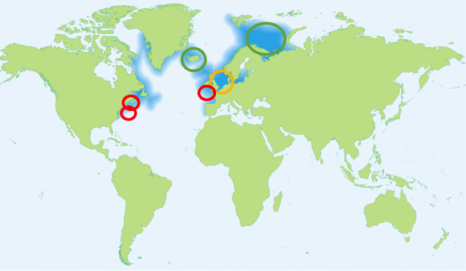
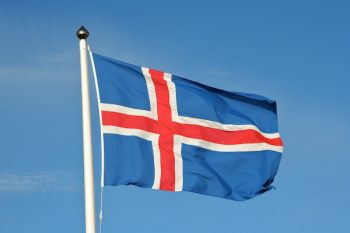 The Icelandic fleet is set to stop fishing next month after union members voted overwhelmingly in favor of strike action over falling earnings. Ninety-one percent of members of the Icelandic Union of Marine Engineers and Metal Technicians voted for a strike, as did 90 percent of the members of associations affiliated to the Seamen’s Union representing deck crews. The ships officers’ union had previously voted to accept the terms of an agreement with owners’ federation SFS (Iceland Fisheries). There are several issues that the pro-strike unions are deeply dissatisfied with, including the percentage that crews of new vessels pay towards construction costs, which is felt to be excessive, not least because there is a number of new vessels set to join the Icelandic fleet over the coming year, with both freezer and fresher trawlers being built at yards in China and Turkey for Icelandic operators.
The Icelandic fleet is set to stop fishing next month after union members voted overwhelmingly in favor of strike action over falling earnings. Ninety-one percent of members of the Icelandic Union of Marine Engineers and Metal Technicians voted for a strike, as did 90 percent of the members of associations affiliated to the Seamen’s Union representing deck crews. The ships officers’ union had previously voted to accept the terms of an agreement with owners’ federation SFS (Iceland Fisheries). There are several issues that the pro-strike unions are deeply dissatisfied with, including the percentage that crews of new vessels pay towards construction costs, which is felt to be excessive, not least because there is a number of new vessels set to join the Icelandic fleet over the coming year, with both freezer and fresher trawlers being built at yards in China and Turkey for Icelandic operators.  A coalition of 20 animal rights and environmentalist groups have called on US President Barack Obama to impose sanctions on Iceland over whaling. In
A coalition of 20 animal rights and environmentalist groups have called on US President Barack Obama to impose sanctions on Iceland over whaling. In 


























